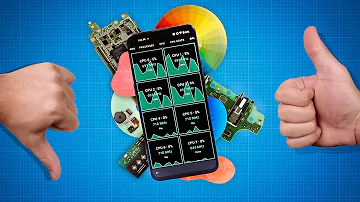Can you root an Android tablet?
Rooting your Android tablet comes with multiple benefits, such as the ability to gain administrative rights to the Android operating system, the option to extend your battery life and memory, and the ability to install apps exclusive to rooted devices.
Is rooting Android tablet illegal?
Your phone warranty turns void.
It's legal to root your phone; however, if you do it, your device goes straight out of warranty. Say you root your phone and sometime after that, you experience a phone malfunction — hardware or software related.

How can I root my Android tablet without a computer?
Step 1: Download the King Root apk on your phone and install it by following the on-screen instructions. Step 2: Launch the app and hit the One Click Root button to trigger the rooting action. Wait until the rooting progresses on the phone.
What is the benefit of rooting Android tablet?
Rooting allows you to install custom Roms and alternative software kernels, so you can run an entirely new system without getting a new handset. Your device can actually be updated to the latest version of Android OS even if you own an older Android phone and the manufacturer no longer allows you to do so.
Can you root a Samsung tablet?
The rooting process may take up to several minutes to complete and requires near-full battery life. Rooting is not supported by Android or Samsung. It is also not guaranteed to work successfully on all tablets. Keep this in mind when attempting to root and do so at your own risk.
Why you shouldn’t root your Android?
The Risks of Rooting
Android is designed in such a way that it's hard to break things with a limited user profile. A superuser, however, can really trash the system by installing the wrong app or making changes to system files. The security model of Android is also compromised when you have root.
How do I manually root my Android tablet?
Four Easy Steps to Root Your Android Phone or Tablet
- Download One Click Root. Download and install One Click Root. onto your PC or Mac.
- Connect Your Device. Connect your Android to your computer. …
- Enable USB Debugging. Open 'Developer Options' …
- Run One Click Root. Run One Click Root and let the software.
What can a rooted tablet do?
A rooted device is an Android gadget that has been jailbroken to install unapproved apps, update OS, delete unwanted apps, underclock or overclock the processor, replace firmware and customize anything else.
What are disadvantages of rooting Android?
Disadvantages of a rooted Android device
- Voided Phone Warranty. Rooting your device will void your phone's service or warranty. …
- Risk of bricking your device. A bricked phone means a dead phone and is the same as carrying around a brick in your pocket. …
- Security Risks. …
- Protect your rooted phone from threats.
Is rooting Android risky?
Security Risks
Rooted devices are more vulnerable to malware attacks. Making changes to the original software codes increases the likelihood of introducing malware.
What is the best Android root?
12 Best Root Apps For Android Phone In 2023 [Updated List]
- Comparison Of The Best Apps For Rooting Android.
- #1) Dr.Fone-Root.
- #2) Magisk Manager.
- #3) Framaroot.
- #4) KingRoot.
- #5) Odin.
- #6) SuperSU.
- #7) RootMaster.
What happens if I root my tablet?
Rooting your Android tablet comes with multiple benefits, such as the ability to gain administrative rights to the Android operating system, the option to extend your battery life and memory, and the ability to install apps exclusive to rooted devices.
What does rooting a tablet do?
Rooting is the Android equivalent of jailbreaking, a means of unlocking the operating system so you can install unapproved apps, deleted unwanted bloatware, update the OS, replace the firmware, overclock (or underclock) the processor, customize anything and so on.
Why you shouldn’t root your device?
You might brick your device simply trying to root it, and you've probably (technically) voided your warranty doing so. Rooting also makes it harder (or impossible) to install official updates, and ROMs like Lineage can be difficult to install and buggy once you do.
What is disadvantage of rooted device?
Rooted devices are more vulnerable to malware attacks. Making changes to the original software codes increases the likelihood of introducing malware.
Is root the same as jailbreak?
Rooting, cracking, or jailbreaking a mobile device, in practice, is essentially the same thing. Essentially, rooting is the term used for modifying Androids while jailbreaking is the term used for iPhones.
Can you go to jail for rooting a phone?
This isn't illegal. Many Android manufacturers and carriers block the ability to root – what's arguably illegal is the act of circumventing these restrictions. Apple never allows users to jailbreak its devices or install unauthorized software, so jailbreaking is always performed without Apple's authorization.
Which is better root or jailbreak?
In practice, jailbreaking is commonly used to install applications from outside the App Store (what the Android users can do without restrictions). While Android rooting basically allows you to gain complete control of the operating system, jailbreaking can only remove some restrictions present in the software.
How long does it take to root a tablet?
If all goes well, your device should be rooted within about 60 seconds. (On my aforementioned Galaxy S6, the process made it to 90 percent, then the phone crashed and rebooted. Luckily, no harm done.)
What is the safest way to root Android?
Fone-Root is the best app for rooting and unrooting your device without voiding the warranty. If you want systemless rooting that allows apps that rely on Android SafetNet to continue working, consider Magisk Manager. In case you want to install a custom ROM after rooting, try Odin.
What is rooting a tablet?
Rooting is the Android equivalent of jailbreaking, a means of unlocking the operating system so you can install unapproved apps, deleted unwanted bloatware, update the OS, replace the firmware, overclock (or underclock) the processor, customize anything and so on.
What are the consequences of rooting an Android phone?
Disadvantages of a rooted Android device
- Voided Phone Warranty. Rooting your device will void your phone's service or warranty. …
- Risk of bricking your device. A bricked phone means a dead phone and is the same as carrying around a brick in your pocket. …
- Security Risks. …
- Protect your rooted phone from threats.
Can you root a tablet?
Rooting your Android tablet comes with multiple benefits, such as the ability to gain administrative rights to the Android operating system, the option to extend your battery life and memory, and the ability to install apps exclusive to rooted devices.
Is rooting device risky?
The Risks of Rooting
Android is designed in such a way that it's hard to break things with a limited user profile. A superuser, however, can really trash the system by installing the wrong app or making changes to system files. The security model of Android is also compromised when you have root.
What does jailbreaking a tablet do?
In practice, jailbreaking is commonly used to install applications from outside the App Store (what the Android users can do without restrictions). While Android rooting basically allows you to gain complete control of the operating system, jailbreaking can only remove some restrictions present in the software.
Is rooting Android still worth it?
At the end of the day it comes down to personal preference – it really depends on what you want to do with your phone & how much control you want to have over your device, versus how much time and effort you want to dump into learning and rooting; only you can decide if it's worth it, to you.


